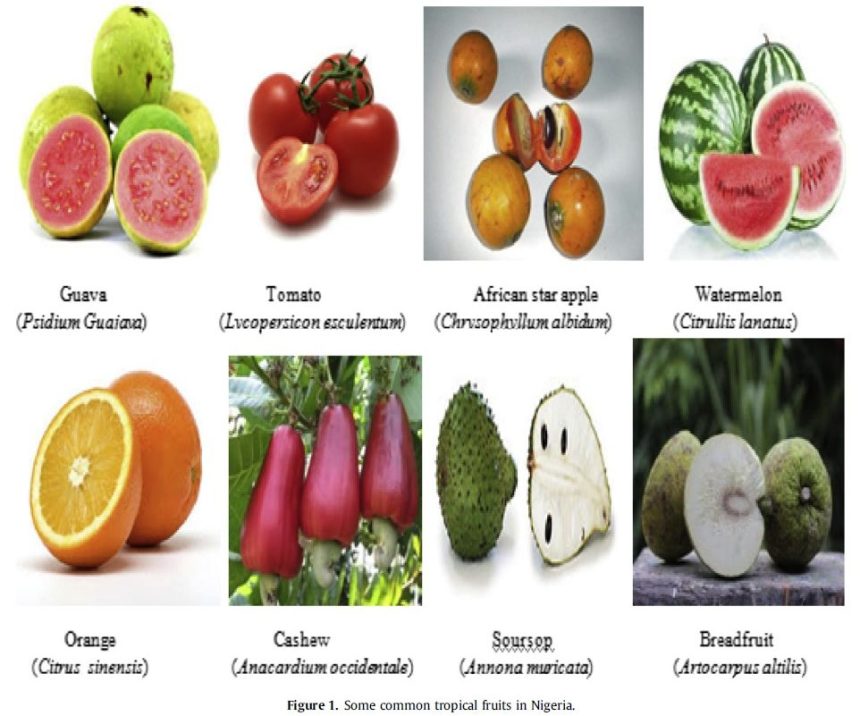Health
The thirteen commonly consumed fruits ranked by the researchers include Banana, Carrot, Avocado pear, Pineapple, Pawpaw, Guava, Tomatoes, African star apple, Watermelon, Orange, Cashew, Soursop, and Breadfruit, based on their antioxidant properties.
African star apple –(Agbalumo-Cherry), guava and cashew has the highest radical scavenging ability and antioxidant properties among commonly consumed fruits and people who want to boost their immune system and fight off opportunistic infections should eat more of the three fruits.
A research team from the Federal University of Technology Akure, FUTA which ranked 13 common fruits based on their antioxidant properties came up with the findings.
The team led by Ganiyu Oboh, a Professor of Food Biochemistry and Toxicology, said since it has been established that fruits and vegetables are rich in dietary sources of various immune-boosting natural chemicals such as vitamins and minerals as well as non-nutrient phytochemicals, including carotenoids, polyphenol and flavonoids, flavones and flavanones, Nigerians should cultivate the habit of eating fruits and vegetables to boost their immune system and fight off diseases as the world battles with the coronavirus pandemic.
The need to consume fruits and vegetables with the potential to boost the immune system according to the team of researchers has been supported by the fact that emerging data has shown that the coronavirus disease fatality is dependent on some immune-related factors especially age and comorbidities.
They said studies have also established that in many hard-hit countries, the aged (>60 years) share the largest proportion of the death rate. This can be associated with the fact that immune systems are generally weakened as ageing progresses.
Furthermore, disease conditions such as cancer, kidney diseases, diabetes, hypertension and others, which inadvertently result in immunosuppression has been classified as co-morbidity of COVID-19 disease and often accelerate fatality in infected patients with such underlying conditions.
The thirteen commonly consumed fruits ranked by the researchers include Banana, Carrot, Avocado pear, Pineapple, Pawpaw, Guava, Tomatoes, African star apple, Watermelon, Orange, Cashew, Soursop, and Breadfruit, based on their antioxidant properties.
According to Mr Oboh, the team also reported that quercetin is present in all the fruits while gallic acid, catechin, epicatechin, rutin, and chlorogenic acid can be found in other phenolic constituents in most of the fruits. These substances can have profound effects on cellular growth and differentiation and are needed for the optimal functioning of the immune system. He said their findings indicate that all the fruits exhibited high antioxidant properties as exemplified by their radicals scavenging abilities
The research group also worked over the years to characterise the antioxidant properties of numerous vegetables; particularly green leafy vegetables, vegetable fruits (peppers, tomato), spices and fruits. Reports from laboratory research revealed that tropical green leafy vegetables ‘Ewuro Odo’ ‘Pumpkin leaf’ ‘Jute’ leaf ‘Sweet basil’ ‘Water leaf’ , Jerusalem leaf and ‘Bitter leaf’ are rich in phytochemicals that could exert interesting antioxidant activities.
According to the researchers, ‘Sweet basil’ leaf (Ocimum gratissimum), had the highest antioxidant properties, while ‘water leaf’ had the lowest antioxidant properties. The researchers urge Nigerians to also cultivate the habit of eating vegetables regularly because of their antioxidant properties and health benefits.
According to the researchers, “The distinctive colors of fruits and vegetables —the deep red color of cherries, the red color in tomatoes, the orange color in carrots, and the yellow color of corn, mangos and saffron, are of great interest. The most well-known antioxidants are vitamins A, C and E, beta carotene, and selenium.
Citrus fruits and their juices, berries, dark green vegetables (spinach, asparagus, green peppers, brussel sprouts, broccoli, watercress, other greens), red and yellow peppers, tomatoes and tomato juice, pineapple, cantaloupe, mangos, papaya and guava are good source of vitamin C, while vegetable oils such as olive, soybean, corn, cottonseed and safflower, nuts and nut butters, seeds, whole grains, wheat, wheat germ, brown rice, oatmeal, soybeans, sweet potatoes, legumes (beans, lentils, split peas) and dark leafy green vegetables are good sources of vitamin E.

Selenium can be gotten by eating Brazil nuts, brewer’s yeast, oatmeal, brown rice, chicken, eggs, dairy products, garlic, molasses, onions, salmon, seafood, tuna, wheat germ, whole grains, most vegetables.
Variety of dark orange, red, yellow and green vegetables and fruits such as broccoli, kale, spinach, sweet potatoes, apple, carrots, red and yellow peppers, apricots, cantaloupe and mangos are good sources of ß-carotene.”
They noted that, “Several studies have demonstrated that a high intake of fruits and vegetables can minimize systemic inflammation and provide dietary interventions on immune cell populations.
Increased natural killer cell (NK cell) cytotoxicity and lymphocyte proliferation have been reported following consumption of different fruits and vegetables juices.”
However, while fruits and vegetables score high as excellent immune boosters it is important to properly lay out the facts in order for the general public to be better informed. They said, “it is important to be well informed on how various processing and culinary practices could influence the medicinal properties of these foods in order to be able to explore them for their maximum benefits”.
Therefore, a balance must be reached between palatability, nutrition, health and body cells protection. For instance they said studies have shown that Sun-drying of green leafy vegetables, which is a popular practice in many homes in Nigeria, as a way of preserving green leafy vegetables for future use, and processing methods of green leafy vegetables, including blanching, steam cooking and sun drying, decrease vitamin C content of the vegetables, reducing property and free radical scavenging ability and overall antioxidant activity of the green leafy vegetables.
The researchers concluded that while boosting the immune system through the ‘right’ consumption of fruits and vegetables could help improve immune tolerance and response to the novel coronavirus disease, no current scientific evidence suggest them as absolute preventive or curative therapy and as such, all other preventive and curative guidelines as prescribed by the relevant health authorities should be adhered to.
Culled from Premium Times NG















